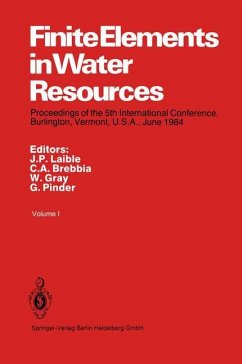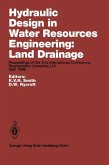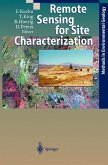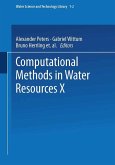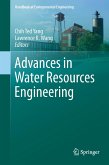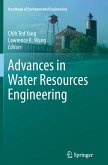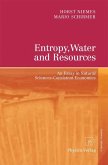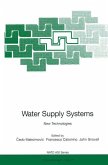Finite Elements in Water Resources
Proceedings of the 5th International Conference, Burlington, Vermont, U.S.A., June 1984
Herausgegeben:Laible, J. P.; Brebbia, C. A.; Gray, W.; Pinder, G.
Finite Elements in Water Resources
Proceedings of the 5th International Conference, Burlington, Vermont, U.S.A., June 1984
Herausgegeben:Laible, J. P.; Brebbia, C. A.; Gray, W.; Pinder, G.
- Broschiertes Buch
- Merkliste
- Auf die Merkliste
- Bewerten Bewerten
- Teilen
- Produkt teilen
- Produkterinnerung
- Produkterinnerung
This book is the edited proceedings of the Fifth International Conference on Finite Elements in Water Resources, held at the University of Vermont, USA in June 1984. This Conference cont inues the successful series started at Princeton University in 1976, followed by the Conference in Imperial College, London, UK in 1978, the third Conference at the University of Mississippi, USA in 1980 and the fourth at the University of Hannover, Germany in 1982. The objective of this Conference is to provide engineers and scientists interested in water resources with the state-of-t- art on finite element…mehr
Andere Kunden interessierten sich auch für
![Hydraulic Design in Water Resources Engineering: Land Drainage Hydraulic Design in Water Resources Engineering: Land Drainage]() Hydraulic Design in Water Resources Engineering: Land Drainage121,99 €
Hydraulic Design in Water Resources Engineering: Land Drainage121,99 €![Remote Sensing for Site Characterization Remote Sensing for Site Characterization]() Remote Sensing for Site Characterization39,99 €
Remote Sensing for Site Characterization39,99 €![Computational Methods in Water Resources X Computational Methods in Water Resources X]() Computational Methods in Water Resources X42,99 €
Computational Methods in Water Resources X42,99 €![Advances in Water Resources Engineering Advances in Water Resources Engineering]() Advances in Water Resources Engineering77,99 €
Advances in Water Resources Engineering77,99 €![Advances in Water Resources Engineering Advances in Water Resources Engineering]() Advances in Water Resources Engineering77,99 €
Advances in Water Resources Engineering77,99 €![Entropy, Water and Resources Entropy, Water and Resources]() Horst NiemesEntropy, Water and Resources77,99 €
Horst NiemesEntropy, Water and Resources77,99 €![Water Supply Systems Water Supply Systems]() Water Supply Systems81,99 €
Water Supply Systems81,99 €-
-
-
This book is the edited proceedings of the Fifth International Conference on Finite Elements in Water Resources, held at the University of Vermont, USA in June 1984. This Conference cont inues the successful series started at Princeton University in 1976, followed by the Conference in Imperial College, London, UK in 1978, the third Conference at the University of Mississippi, USA in 1980 and the fourth at the University of Hannover, Germany in 1982. The objective of this Conference is to provide engineers and scientists interested in water resources with the state-of-t- art on finite element modelling. The Proceedings review the basic theory and applications of the technique in groundwater and seepage, transport phenomena, viscous flow, river, lake and ocean modelling. The fundamentals of the numerical techniques employed in finite elements are also discussed. Many applications illus trate the versatility and generality of the Finite Element Method for the simulation of a wide range of problems in water resources. More recent schemes, in particular, boundary elements, are also presented, together with a series of advanced numerical techniques. The Conference has become an internationally accepted forum for the presentation of new developments of finite elements in water resources techniques. Because of this, a large number of abstracts were submitted to the Organizing Committee and it is our only reg ret that it was impossible to accept all these contributions. The overwhelming response to our Call for Papers has ensured the high quality of these proceedings.
Produktdetails
- Produktdetails
- Verlag: Springer / Springer Berlin Heidelberg / Springer, Berlin
- Artikelnr. des Verlages: 978-3-662-11746-0
- Softcover reprint of the original 1st ed. 1984
- Seitenzahl: 840
- Erscheinungstermin: 4. Dezember 2014
- Englisch
- Abmessung: 229mm x 152mm x 45mm
- Gewicht: 1227g
- ISBN-13: 9783662117460
- ISBN-10: 3662117460
- Artikelnr.: 41325393
- Herstellerkennzeichnung Die Herstellerinformationen sind derzeit nicht verfügbar.
- Verlag: Springer / Springer Berlin Heidelberg / Springer, Berlin
- Artikelnr. des Verlages: 978-3-662-11746-0
- Softcover reprint of the original 1st ed. 1984
- Seitenzahl: 840
- Erscheinungstermin: 4. Dezember 2014
- Englisch
- Abmessung: 229mm x 152mm x 45mm
- Gewicht: 1227g
- ISBN-13: 9783662117460
- ISBN-10: 3662117460
- Artikelnr.: 41325393
- Herstellerkennzeichnung Die Herstellerinformationen sind derzeit nicht verfügbar.
Mathematics and Numerical Techniques.- Adjoint Sensitivity Theory for the Finite Element Method.- Why Upwinding is Reasonable.- A Coupled Finite Element Model of Flow in Porous Layered Media.- Hybrid Methods from a New Perspective.- Numerical Experiments Using 'Adaptive' Finite Elements with Collocation.- Dynamic Velocity Profiles on Simple Elements - Model Design and Testing.- Groundwater Flow and Seepage.- Finite Elements in Analysis of Effect of Stochastic Variability in Aquifer Conductivity on Hydraulic Head.- Logarithmic Interpolation for Groundwater Flow Near Wells.- A Mass-Conservative Procedure for Time-Stepping in Models of Unsaturated Flow.- Saturated-Unsaturated Transient Finite Element Seepage Model for Geotechnical Engineering.- Numerical Modelling of Groundwater Flow in a Large Agricultural Area.- Groundwater Dynamics Investigation of Enjebi Island, Enewetak Atoll: An Interpretive Computer Model Simulation.- The Impact of Phase Exchange Transfers and Unsteady Hydraulic Conditions on Saltwater Intrusion Fronts.- Finite Element Simulation of Kenematic Surface Runoff.- A Finite Element-Finite Difference Alternating Direction Algorithm for Three Dimensional Groundwater Transport.- Modelling Ground-water Flow with the Global and Finite Element Methods.- Techniques for Making Finite Elements Competitive in Modeling Three-Dimensional Flow and Transport.- Adjoint State Finite Element Estimation of Aquifer Parameters Under Steady-State and Transient Conditions.- Computation of Porous Media Natural Convection Flow and Phase Change.- Finite Element Approximation of Nonlinear Variational Inequalities Arising in Porous Media.- Finite Element Computation of Unsaturated and Saturated Groundwater Flow in Stratified Aquifers.- Second Order Effects of UncertainTransmissivities on Predictions of Piezometric Heads.- Adjusting the Nodal Point Distribution in Domain Groundwater Flow Numerical Models.- Transport Phenomena.- Solution of Contaminant Transport Equations Using an Orthogonal Upstream Weighting Finite Element Scheme.- Adaptive Collocation Method for the Transport Problem Induced by Irregular Well Patterns.- Finite Element Analysis of Multicomponent Contaminant Transport Including Precipitation-Dissolution Reactions.- Groundwater Flow and Mass Transport by Finite Elements - A Parametric Study.- Simulation of Mass Transport in Rotating Flow Using the Finite Element Method.- Wastewater Utilization in the Problem of Water Resources Management.- The 2-D, Unsteady, Transport Equation Solved by the Combined Use of the Finite Element Method and the Method of Characteristics.- The Principal Direction Technique for Advective Dispersive-Transport Simulation in Three Dimensions.- Ocean Lake and River Modeling.- Circulation Over Continental Shelves and Shelf-Break Regions.- Finite Element Analysis of Combined Diffraction - Refraction.- Linear Short Wave Modeling for Harbours.- Finite Element Models for the Study of Estuaries, Lagoons, and Coastal Seas.- Application of Constraints in Modelling Tidal Power Generation.- Shallow-Water Waves at Ursell Numbers of Order Unity.- A Two Dimensional Analysis of the Wave Equation Model for Finite Element Tidal Computations.- Finite Element Computation of Two-Dimensional Unsteady Flow for River Problems.- Fourier Analysis for Testing a Finite Elements Method in Shallow Water Problems.- A Finite Element Method for Storm Surge and Tidal Computation.- A Time Variant Computational Mesh Technique to Simulate a Large Scale Ponding Test.- Prediction of Main Channel/Flood Plain Flow Interactionwith FEM.- On the Application of Digital Surface Representations in Hydrodynamic Modelling.- An Implicit Wave Equation Model for the Shallow Water Equations.- A Review of Strategies for Finite Element Modeling of Three Dimensional Hydrodynamic Systems.- Simulating Flood Flows by Coupled 1-D and 2-D Models.- An Application of Finite Element Methods for Modelling Wind Driven Circulations in a Stratified Ocean.- On the Automatic Calibration of Tidal and Transport Models.- Finite Element Solution Methods for Circulation in Estuaries.- Nested Models: Applications to Practical Problems.- A Modified Wave Equation Model for 3D Flow in Shallow Bodies of Water.- Weakly-Reflective Boundary Conditions for Two-Dimensional Shallow Water Flow Problems.- Solution of the Navier Stokes Equations.- Turbulence Modelling for Marine Current and the Related Finite Element System of Equations.- Finite Element Modeling of Density-Driven Recirculating Turbulent Flow.- Recent Developments in the Application of the F. E. M. to Fully Three Dimensional Turbulent Flow.- Another Attempt to Overcome the Bent Element Blues.- Sedimentation Processes.- Coastal Sedimentation Processes Modeling.- Application of Finite Element Techniques to Heat Flow Investigations Within Sedimentation Basins.- Boundary Element Method.- Simulation of Steady-State Flow in Three-Dimensional Fracture Networks Using the Boundary Element Method.- Boundary Element Analysis of Flow in Aquifers.- Boundary Integral Solution of Darcy's Flow With Variable Permeability.- Diffusion-Convection Problems Using Boundary Elements.- Boundary Element Solutions to an Inverse Groundwater Problem.- Additional Papers.- An Upstream Weight Finite Element Method for Solving the 3-Dimensional Convection-Dispersive Equations.- Author Index.
Mathematics and Numerical Techniques.- Adjoint Sensitivity Theory for the Finite Element Method.- Why Upwinding is Reasonable.- A Coupled Finite Element Model of Flow in Porous Layered Media.- Hybrid Methods from a New Perspective.- Numerical Experiments Using 'Adaptive' Finite Elements with Collocation.- Dynamic Velocity Profiles on Simple Elements - Model Design and Testing.- Groundwater Flow and Seepage.- Finite Elements in Analysis of Effect of Stochastic Variability in Aquifer Conductivity on Hydraulic Head.- Logarithmic Interpolation for Groundwater Flow Near Wells.- A Mass-Conservative Procedure for Time-Stepping in Models of Unsaturated Flow.- Saturated-Unsaturated Transient Finite Element Seepage Model for Geotechnical Engineering.- Numerical Modelling of Groundwater Flow in a Large Agricultural Area.- Groundwater Dynamics Investigation of Enjebi Island, Enewetak Atoll: An Interpretive Computer Model Simulation.- The Impact of Phase Exchange Transfers and Unsteady Hydraulic Conditions on Saltwater Intrusion Fronts.- Finite Element Simulation of Kenematic Surface Runoff.- A Finite Element-Finite Difference Alternating Direction Algorithm for Three Dimensional Groundwater Transport.- Modelling Ground-water Flow with the Global and Finite Element Methods.- Techniques for Making Finite Elements Competitive in Modeling Three-Dimensional Flow and Transport.- Adjoint State Finite Element Estimation of Aquifer Parameters Under Steady-State and Transient Conditions.- Computation of Porous Media Natural Convection Flow and Phase Change.- Finite Element Approximation of Nonlinear Variational Inequalities Arising in Porous Media.- Finite Element Computation of Unsaturated and Saturated Groundwater Flow in Stratified Aquifers.- Second Order Effects of UncertainTransmissivities on Predictions of Piezometric Heads.- Adjusting the Nodal Point Distribution in Domain Groundwater Flow Numerical Models.- Transport Phenomena.- Solution of Contaminant Transport Equations Using an Orthogonal Upstream Weighting Finite Element Scheme.- Adaptive Collocation Method for the Transport Problem Induced by Irregular Well Patterns.- Finite Element Analysis of Multicomponent Contaminant Transport Including Precipitation-Dissolution Reactions.- Groundwater Flow and Mass Transport by Finite Elements - A Parametric Study.- Simulation of Mass Transport in Rotating Flow Using the Finite Element Method.- Wastewater Utilization in the Problem of Water Resources Management.- The 2-D, Unsteady, Transport Equation Solved by the Combined Use of the Finite Element Method and the Method of Characteristics.- The Principal Direction Technique for Advective Dispersive-Transport Simulation in Three Dimensions.- Ocean Lake and River Modeling.- Circulation Over Continental Shelves and Shelf-Break Regions.- Finite Element Analysis of Combined Diffraction - Refraction.- Linear Short Wave Modeling for Harbours.- Finite Element Models for the Study of Estuaries, Lagoons, and Coastal Seas.- Application of Constraints in Modelling Tidal Power Generation.- Shallow-Water Waves at Ursell Numbers of Order Unity.- A Two Dimensional Analysis of the Wave Equation Model for Finite Element Tidal Computations.- Finite Element Computation of Two-Dimensional Unsteady Flow for River Problems.- Fourier Analysis for Testing a Finite Elements Method in Shallow Water Problems.- A Finite Element Method for Storm Surge and Tidal Computation.- A Time Variant Computational Mesh Technique to Simulate a Large Scale Ponding Test.- Prediction of Main Channel/Flood Plain Flow Interactionwith FEM.- On the Application of Digital Surface Representations in Hydrodynamic Modelling.- An Implicit Wave Equation Model for the Shallow Water Equations.- A Review of Strategies for Finite Element Modeling of Three Dimensional Hydrodynamic Systems.- Simulating Flood Flows by Coupled 1-D and 2-D Models.- An Application of Finite Element Methods for Modelling Wind Driven Circulations in a Stratified Ocean.- On the Automatic Calibration of Tidal and Transport Models.- Finite Element Solution Methods for Circulation in Estuaries.- Nested Models: Applications to Practical Problems.- A Modified Wave Equation Model for 3D Flow in Shallow Bodies of Water.- Weakly-Reflective Boundary Conditions for Two-Dimensional Shallow Water Flow Problems.- Solution of the Navier Stokes Equations.- Turbulence Modelling for Marine Current and the Related Finite Element System of Equations.- Finite Element Modeling of Density-Driven Recirculating Turbulent Flow.- Recent Developments in the Application of the F. E. M. to Fully Three Dimensional Turbulent Flow.- Another Attempt to Overcome the Bent Element Blues.- Sedimentation Processes.- Coastal Sedimentation Processes Modeling.- Application of Finite Element Techniques to Heat Flow Investigations Within Sedimentation Basins.- Boundary Element Method.- Simulation of Steady-State Flow in Three-Dimensional Fracture Networks Using the Boundary Element Method.- Boundary Element Analysis of Flow in Aquifers.- Boundary Integral Solution of Darcy's Flow With Variable Permeability.- Diffusion-Convection Problems Using Boundary Elements.- Boundary Element Solutions to an Inverse Groundwater Problem.- Additional Papers.- An Upstream Weight Finite Element Method for Solving the 3-Dimensional Convection-Dispersive Equations.- Author Index.

